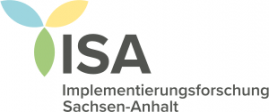ISA - Implementation research Saxony-Anhalt
New diagnostic tools, prevention approaches and therapies are constantly being developed, refined and evaluated in medical and clinical-psychological research. In an ideal world, those instruments and therapies that are scientifically proven to be effective under strictly controlled conditions would always be implemented in practice. However, current estimates indicate that only 14% of such evidence-based approaches are implemented in practice (Rapport et al., 2022). Why is transfer into practice so rare and how can this process be facilitated?
Implementation research systematically examines the drivers and barriers as well as the costs for the implementation of innovative technologies and new care models. In doing so, it takes into account the perspective of future users as well as those responsible for shaping policy and the healthcare system.
Contact: isa[at]med.ovgu.de
Project Goals
In our joint project ISA - Implementation Science Saxony-Anhalt, we are systematically anchoring this research direction in the region for the first time, with a particular focus on the medically and psychosocially underserved North Saxony-Anhalt. Together, the Institute for Social Medicine and Health Systems Research (ISMG) and the Clinic for Psychosomatic Medicine and Psychotherapy (KPSM) will take a closer look at two particularly vulnerable areas of the healthcare system: emergency and intensive care medicine and psychosocial medicine. We will examine the current care situation as well as factors promoting and barriers to the implementation of innovative methods and new care models. In this context, we also evaluate strategies that improve the implementation of evidence-based methods in medicine.
We address our different research priorities in three sub-projects, which are presented below.
Subproject A: Emergency and Intensive Care Medicine
In sub-project A, we are investigating how evidence-based care and aftercare concepts for patients during and after emergency and intensive care treatment can be implemented in medical care practice. In doing so, we analyze barriers, facilitating factors and contextual conditions in order to contribute to a sustainable improvement in care with suitable implementation strategies.
Our project currently focuses on four areas:
- Inventory and mapping in the field of emergency and intensive care medicine
- eDyKo – Uniform dysphagia dietary levels in northern Saxony-Anhalt: Development of strategies for cross-sector implementation
- Management of sarcopenia in chronic advanced liver disease
- Implementation of delirium screenings in emergency departments in northern Saxony-Anhalt: Development of a strategy based on a comprehensive assessment of current challenges and opportunities
- Analysis of patient-side barriers to the use of the nationally standardized medication plan in emergency departments
-
Economic modeling of potential cost savings through optimized acute medical care
The perspectives of physicians, nursing staff, allied professions and patients are systematically taken into account. The aim is to gain and implement robust findings on the conditions for the success of evidence-based care - with a particular focus on the structurally weak region of North Saxony-Anhalt.
Subproject B: Psychosocial Medicine
In subproject B, three innovative projects are being carried out that focus on improving psychosocial care in Saxony-Anhalt. These projects combine digital technologies with the methods of implementation and transfer research and are aimed at sustainable implementation in practice.
You can find out more about this sub-project here.
Subproject C: Rural Cohort Saxony-Anhalt (LäKoSA)
Saxony-Anhalt's small towns and rural areas are particularly affected by demographic change and the associated structural shifts in medical care. This often leads to fears among the older population regarding the future provision of adequate healthcare. Local challenges include an increasing shortage of doctors, supply bottlenecks, a lack of networking between stakeholders and an inadequate infrastructure for digital healthcare solutions. Due to long distances, there are access restrictions to specialized medical treatments, preventive and rehabilitation services as well as limited emergency care.
In order to record the subjective perception of the current care situation and quality as well as the framework conditions and openness to the implementation of new forms of care in northern Saxony-Anhalt, a cohort of approximately 5,000 citizens aged around 40 and older from various municipalities in the districts of Stendal and Altmarkkreis Salzwedel is being established. These individuals will be surveyed twice a year about their experiences with medical care. To develop the questionnaire, focus groups with interested citizens are conducted beforehand, allowing them to share their opinions and experiences regarding healthcare and thus directly influence the content of the survey. In addition, citizens and regional stakeholders are continuously involved in the project through semi-annual workshops. To represent population and care structures in the regions, secondary data such as official statistics, infrastructure data, basic data of the single and association municipalities, etc. are also used.
The cohort approach enables longitudinal observation of the healthcare situation and quality and its evaluation by the population. By having direct access to the population, an instrument is created that allows for the long-term evaluation of measures aimed at improving medical care and can reflect changes in the care structure.
Involved Institutes
| Institute for Social Medicine and Health Systems Research (ISMHSR), Medical Faculty, Otto von Guericke University Magdeburg | ||
|
University Clinic for Psychosomatic Medicine and Psychotherapy, University Hostpital Magdeburg |
||
Cooperation Partners
|
Prof. Dr. Michel Wensing, Professorship for Health Services Research and Implementation Science, Faculty of Medicine, Heidelberg University |
||
| Prof. Dr. Robert Werdehausen, University Clinic for Anesthesiology and Intensive Therapy, University Hospital Magdeburg | ||
| apl. Prof. Dr. Christoph Nikendei und Nadja Gebhardt, Clinic for General Internal Medicine and Psychosomatics, Heidelberg University Hospital |
Funding
The joint project is funded by the European Regional Development Fund (ERDF) - Saxony-Anhalt, over the funding period 01.09.2024 to 31.12.2027.
![]()







